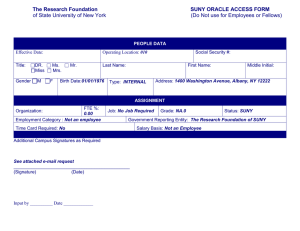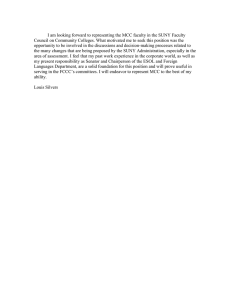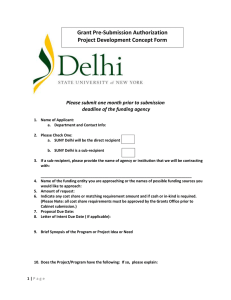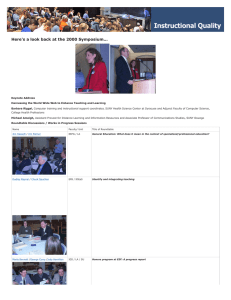THE PUBLIC HIGHER EDUCATION EMPOWERMENT AND INNOVATION ACT
advertisement
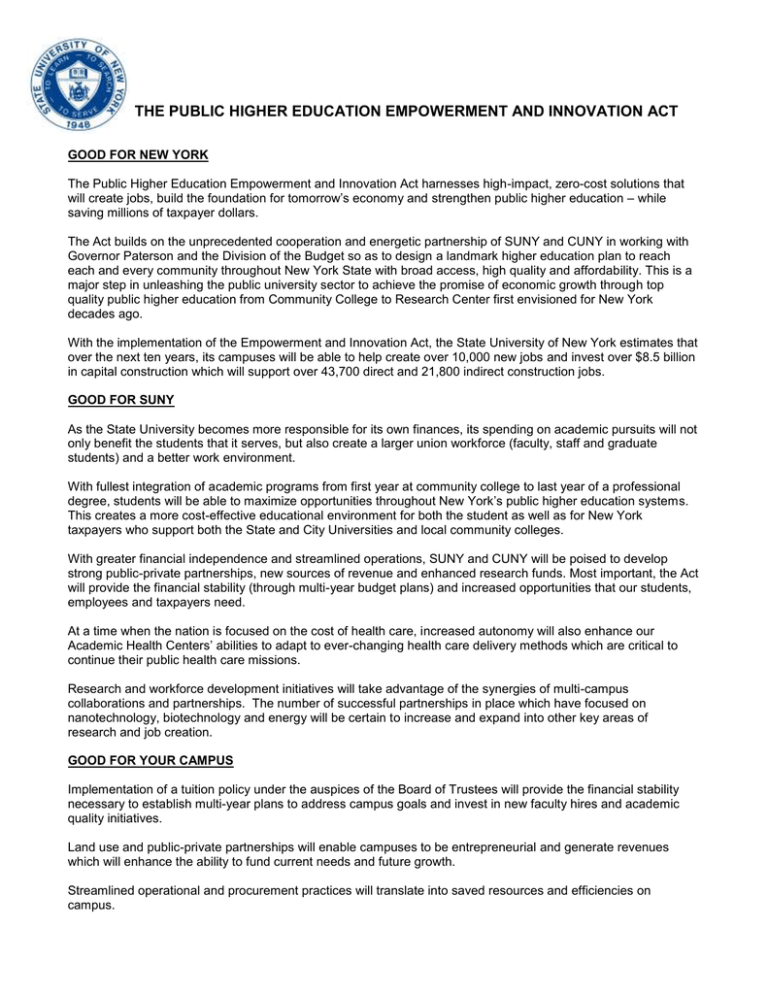
THE PUBLIC HIGHER EDUCATION EMPOWERMENT AND INNOVATION ACT GOOD FOR NEW YORK The Public Higher Education Empowerment and Innovation Act harnesses high-impact, zero-cost solutions that will create jobs, build the foundation for tomorrow’s economy and strengthen public higher education – while saving millions of taxpayer dollars. The Act builds on the unprecedented cooperation and energetic partnership of SUNY and CUNY in working with Governor Paterson and the Division of the Budget so as to design a landmark higher education plan to reach each and every community throughout New York State with broad access, high quality and affordability. This is a major step in unleashing the public university sector to achieve the promise of economic growth through top quality public higher education from Community College to Research Center first envisioned for New York decades ago. With the implementation of the Empowerment and Innovation Act, the State University of New York estimates that over the next ten years, its campuses will be able to help create over 10,000 new jobs and invest over $8.5 billion in capital construction which will support over 43,700 direct and 21,800 indirect construction jobs. GOOD FOR SUNY As the State University becomes more responsible for its own finances, its spending on academic pursuits will not only benefit the students that it serves, but also create a larger union workforce (faculty, staff and graduate students) and a better work environment. With fullest integration of academic programs from first year at community college to last year of a professional degree, students will be able to maximize opportunities throughout New York’s public higher education systems. This creates a more cost-effective educational environment for both the student as well as for New York taxpayers who support both the State and City Universities and local community colleges. With greater financial independence and streamlined operations, SUNY and CUNY will be poised to develop strong public-private partnerships, new sources of revenue and enhanced research funds. Most important, the Act will provide the financial stability (through multi-year budget plans) and increased opportunities that our students, employees and taxpayers need. At a time when the nation is focused on the cost of health care, increased autonomy will also enhance our Academic Health Centers’ abilities to adapt to ever-changing health care delivery methods which are critical to continue their public health care missions. Research and workforce development initiatives will take advantage of the synergies of multi-campus collaborations and partnerships. The number of successful partnerships in place which have focused on nanotechnology, biotechnology and energy will be certain to increase and expand into other key areas of research and job creation. GOOD FOR YOUR CAMPUS Implementation of a tuition policy under the auspices of the Board of Trustees will provide the financial stability necessary to establish multi-year plans to address campus goals and invest in new faculty hires and academic quality initiatives. Land use and public-private partnerships will enable campuses to be entrepreneurial and generate revenues which will enhance the ability to fund current needs and future growth. Streamlined operational and procurement practices will translate into saved resources and efficiencies on campus. WHAT’S IN THE BILL Tuition Policy and Financing Allows for differential tuition by campus and program; SUNY Board must adopt tuition policy that is fair, equitable and responsible and that includes guidelines for across the board tuition adjustments, differential tuition and enrollment planning; SUNY Board must adopt out of state enrollment maximum percentage limitations; Invests all tuition, fees and other self-generated revenues in SUNY campuses, students and faculty; and Repeals Education Law §355(8-b), enacted in 2009. Land Use, Public-Private Partnerships and Construction Fund Authorizes the SUNY Board to accept gifts of real property; Authorizes SUNY to undertake land leases without special legislation for projects not in conflict with campus missions, subject to approval by a newly chartered State University Asset Maximization Review Board; Authorizes SUNY to enter joint ventures and public private partnerships, subject to approval by the State University Asset Maximization Review Board; Requires land leases include: MWBE, prevailing wage, union worker rights protection, reverter clauses, and project labor agreements; Allows the State University Construction Fund to use expanded delivery methods, including design/build and construction manager at risk; Eliminates burdensome and duplicative State Comptroller/Attorney General pre-approval of Construction Fund contracts; Waives Construction Fund performance bonds for contracts less than $250,000; Authorizes DASNY (Dormitory Authority) to finance/construct facilities on behalf of State-operated and community college affiliates; and Authorizes DASNY to finance/construct community college dormitories directly on behalf of each community college. Procurement Efficiencies Eliminates burdensome and duplicative State Comptroller/Attorney General pre-approval of SUNY,CUNY and their Construction Funds contracts; Broadens SUNY access to the Office of General Services centralized contracts for goods and services; and Streamlines approval for residential halls built by SUNY alumni associations. Operations Efficiencies Provides protection from liability for students participating in clinical internships related to their field of study; Provides an Employee Retirement System (ERS) option for medical, dental and optometric interns; and Aligns SUNY and CUNY to the eight year master planning process applicable to the independent colleges and universities in NYS. Hospital Reforms Provisions relating to nurse wage rates and pay differentials; Facilitates hospitals participating in joint ventures and managed care to provide health care related services; and Eliminates burdensome and duplicative State Comptroller/Attorney General pre-approval of SUNY hospital contracts, including those involving real property transactions. 1-15-10
